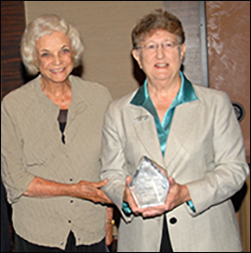Molly Justice
Director of Communications & Online Media
(757) 259-1564
Justice Sandra Day O’Connor, judicial trailblazer and friend of NCSC, leaves a legacy of public service
 Justice O’Connor, left, with Retired South Carolina Chief Justice Jean Hoefer Toal, the inaugural recipient of the Sandra Day O’Connor Award for the Advancement of Civics Education in 2010. |
Williamsburg, Va. (Dec. 1, 2023) – Justice Sandra Day O’Connor, who died today, was a long-time friend and supporter of the National Center for State Courts (NCSC).
She was delighted to recognize those who shared her passion for civics education and played an active role in choosing the recipients of NCSC’s Sandra Day O’Connor Award for the Advancement of Civics Education.
As an Arizona state senator, a Maricopa County Superior Court judge, an Arizona Court of Appeals judge and a U.S. Supreme Court associate justice, Justice O’Connor was always known for her remarkable intellect and insatiable curiosity.
“Justice O’Connor’s legacy as a jurist and civics education advocate will live on for generations to come,” said NCSC Board Chair and Conference of Chief Justices President Anna Blackburne-Rigsby, Chief Judge of the DC Court of Appeals.
NCSC President Mary McQueen spoke with Justice O’Connor several times over the years about state courts.
“At our first meeting, the White opinion (Republican Party of Minn. v. White) and the political challenges facing an elected state judiciary were at the forefront of her concerns about the state courts,” McQueen said. “As a former state senator in Arizona, Justice O’Connor had worked diligently to adopt and implement a system of judicial merit selection in her home state. Her major concerns were the impact that campaign financing and partisan politics in rough-and-tumble judicial elections might have on judicial independence.”
Justice O’Connor made that clear in her concurring opinion in White: “I join the opinion of the Court but write separately to express my concerns about judicial elections generally … Minnesota has chosen to select its judges through contested popular elections instead of through an appointment system or a combined appointment and retention election system. In doing so, the State has voluntarily taken on the risks to judicial bias. As a result, the State's claim that it needs to significantly restrict judges' speech in order to protect judicial impartiality is particularly troubling. If the State has a problem with judicial impartiality, it is largely one the State brought upon itself by continuing the practice of popularly electing judges.”
And while her career took her to the Supreme Court of the United States, Justice O’Connor always took pride that she began her judicial career at the state court level.
In 1974, she was appointed to Maricopa County Superior Court, serving from 1975 to 1979, when she was elevated to the Arizona Court of Appeals. She spent two years on the appellate court until 1981, when President Ronald Reagan nominated her to the U.S. Supreme Court. The Rev. Jerry Falwell and other conservatives opposed her nomination because of her support of the Equal Rights Amendment and her refusal to take a public position on abortion, but she won U.S. Senate approval 99-0. (U.S. Sen. Max Baucus, D-Montana, who was absent from the Senate that day, sent her an apology note and a copy of the novel A River Runs Through It.)
She will forever be known as the first woman to serve on the nation’s highest court, and that destined her for inclusion on lists of the most powerful women in the world. She was also considered by many to be the most powerful Supreme Court associate justice – male or female -- during much of her tenure because she often cast the swing vote. Never did her swing vote get more attention and scrutiny than for Bush v. Gore, in which the Supreme Court halted vote counting in Florida after the 2000 presidential election, ensuring a victory for President George W. Bush.
Among published appreciations of Justice O’Connor is one from Linda Greenhouse, a journalist who covered the U.S. Supreme Court for three decades. “What interests me is less where she stood on the court’s political spectrum than how she got there. The answer, of particular relevance today, is twofold. One, she cared about the impact of the court’s decisions — not only on the law, but on the country itself. And two, she was willing to learn,” she wrote.
Justice O’Connor retired to Arizona in 2006 to care for her husband, John, who died in 2009, three months after President Barack Obama awarded her with the Presidential Medal of Freedom.
In October 2018, she announced her retirement from public life. A year later, following the death of Justice John Paul Stevens, she became the last living justice to have served on the Burger Court. Which we, at NCSC, find very fitting. Former U.S. Supreme Court Chief Justice Warren Burger helped found our institution, and Justice O’Connor will be forever tied to it.
